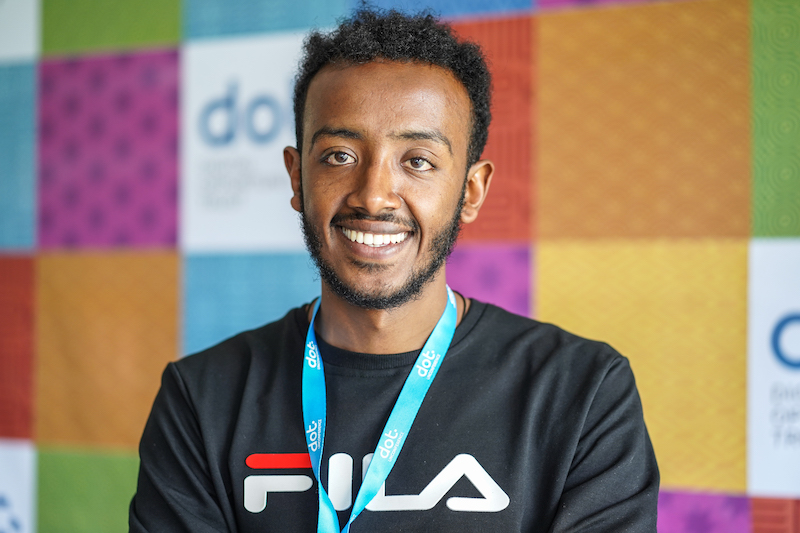Story
Dagim

Giving new life to old tires
When we think of the impact cars have on the environment, we often consider the gas they guzzle and the emissions they create. But these modern forms of transportation also produce another environmental toll: old tires.
“Scrap tires are thrown all over the corners of our country, and there are people who burn them in order to extract steel,” says Dagim Asrat. “One small tire releases so many chemicals when it burns, and that pollutes the waterways and the air.” Through his social innovation, Prime Recycling, Dagim is making sure tires from all modes of transportation are given a second life.
Prime Recycling is Ethiopia’s first tire recycling company. Using a technology called pyrolysis, discarded tires are transformed into raw materials such as crude oil. Pyrolysis is the act of heating something in an oxygen-free chamber until it breaks down into its original form. The crude oil can be processed to make diesel fuel, which will be used to power Prime Recycling’s machines. You can further refine the diesel to produce carbon black powder which is a component of paints, steel ware, plastics, and rubber.
Studying to be a public health officer at Hawassa University in southern Ethiopia, Dagim’s journey to entrepreneurship began when he heard about a social innovation competition DOT Ethiopia was running on International Youth Day. That was when he began trying to find an innovative idea that would help society. “My observations showed many people were engaged in recycling waste, but not tires or plastics,” he says. “The unique thing about tire recycling is that you do not need to import other chemicals to break it down, which is good because they are hard to find in our country.”
“My observations showed many people were engaged in recycling waste, but not tires or plastics,” says Dagim. “The unique thing about tire recycling is that you do not need to import other chemicals to break it down, which is good because they are hard to find in our country.”
Coming across the idea of tire pyrolysis on the internet, Dagim entered the three-month DOT impactathon to learn the startup and business planning skills needed to start Prime Recycling. “Without any question, DOT helped me and my friends equally. There were always DOT people who supported us and were willing to see our perspective, whether we won the competition or not,” he says.
And win Dagim did — the regional competition and then the national one. “The most well-known entrepreneurs in Ethiopia were at the national competition. They told me to go with the idea and even wanted a share in the business,” Dagim says of his winning. “Even my father agreed to invest some of his savings!”
The most well-known entrepreneurs in Ethiopia were at the national competition. They told me to go with the idea and even wanted a share in the business.
The next steps happened very quickly. Dagim was welcomed by government officials and was given land south of the capital city, Addis Ababa, to construct his recycling plant. A few weeks later he was off to China on official invitation from companies that were interested in producing his tire pyrolysis machine. By the end of the trip, Dagim had a custom machine designed, and it is currently making its five-month-long shipping journey from China to Ethiopia.
Aspirations for employment and East Africa
With the machine secured, Prime Recycling is well on its way to operation. In addition to being given the land for his factory, Dagim is in the midst of doing the paperwork to certify the business as eco-friendly and pollution-free — it will be powered solely on the crude oil produced in the tire pyrolysis process.
Dagim says he is hoping to launch the factory in May 2019 and employ 800 people within the first year. The factory will recycle an estimated 10 tons of waste per day — about 1,100 tires.
“We are also organizing small enterprises for women in 23 regions so they can collect the discarded tires as an association,” Dagim explains, adding that training will happen while they wait for the machine to be delivered.
Once operational, steel factories are Dagim’s target market for his recycled crude oil. In Ethiopia, steel companies are not allowed to use electricity to run and rely on overly-expensive crude oil or imported charcoal, both of which are harmful to the environment. According to Dagim, a number of steel companies have already committed to buying Prime Recycling’s crude oil. If the projections in his business plan are correct, the business is expected to break even in six to eight months.
“Our products are very cheap since they are recycled. That means everything we will produce is marginally cheaper than the existing market,” Dagim says of the crude oil and other products. “People’s awareness is increasing around recycling, and that is helping our marketing. In the next 10 years, we want to become a leading waste tire processor in Ethiopia and Europe, and launch in other parts of East Africa.”
At DOT we’re excited to bring you inspiring stories that highlight the impact of daring young social entrepreneurs. Social entrepreneurship and social innovation is an ongoing journey, so we invite you to follow along with Dagim by following him on Twitter @Dagim_abu .
This #DOTYouth Spotlight was developed as a part of DOT’s 2018 Unconference in Nairobi, Kenya, supported by the Government of Canada through Global Affairs Canada.
Are you our next Community Leader, Digital Champion, or Social Innovator? Learn more about how to join #DOTYouth
Join #DOTYouthShare this STORY
More STORIES
Read more inspiring stories like Dagim.